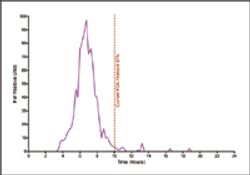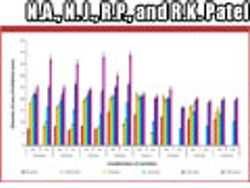In the Field: Report from Brazil
Is Brazil's pharmaceutical industry following the consolidation trend?
According to most analysts, the global pharmaceutical industry is going through a consolidation phase. Major moves were reported throughout last year, including the high-profile acquisitions of Wyeth (Madison, WI) by Pfizer (New York) for $68 billion, Schering-Plough (Kenilworth, NJ) by Merck & Co. (Whitehouse Station, NJ) for $41.1 billion, and Genentech (South San Francisco, CA) by Roche (Basel, Switzerland) for $46.8 billion. But is Brazil's pharmaceutical industry following the trend?
PHOTO: ADALBERTO RIOS SZALAY/SEXTO SOL / GETTY IMAGES
Following the trend
"Yes, Brazil is definitely following the trend, aiming at cost-cutting goals and diversifying portfolios," says Alexandre Gallotti, a pharmaceutical sector economist for the São Paulo-based consulting firm Tendências Consultoria Integrada. According to Gallotti, one major acquisition involving a local company could set the pace for the industry's next steps. In April, Brazilian São Paulo-based generic-drug manufacturer Medley (São Paulo) was acquired by French major sanofi-aventis (Paris) for R$1.5 billion ($798 million). The third largest pharmaceutical firm in the country, Medley held 5.7% of the overall pharmaceutical sector domestic share and reported 2008 revenues of R$458 million ($244 million).
Before the deal, sanofi-aventis already had a strong presence in the Brazilian pharmaceutical industry, with its largest plant located in Suzano, São Paulo. sanofi's sites also include administrative and research offices located in the city of São Paulo. But with the move, the French company now accounts for 12% of Brazil's pharmaceutical market in terms of sales, according to Tendências Consultoria figures, and leads the generic-drug sector, not only in Brazil, but also in Latin America as a whole. In October 2009, the company announced plans to build a $45-million plant in Brasília to produce generic contraceptives with a target operational date of 2012.
"There is no doubt that the consolidation here too is being driven by the expiration of major drug patents.... which makes generics producers a potential target for acquisitions," explains Gallotti.
Jumping R&D hurdles
According to a recent Tendências Consultoria report, the development of new drugs could revert the projected drop in earnings of drug-producing laboratories. The problem is that research and development (R&D) units have had limited success in developing new drugs to be patented as results have not come out as expected, while operating costs have been very high. Also, to apply for patents and comply with the strict rules imposed on sales of prescription drugs, companies have had to risk large sums.
After completing a merger or acquisition, companies may be in a better position to cut production costs. Lower costs could lead to reduced drug prices for consumers, according to Gallotti. But citizens in Brazil, and throughout Latin America, may not see any real benefits for some time. "Those moves would increase companies' market strength in the region and hold prices from falling," says Gallotti. "Companies would probably keep the extra profit," he adds. On the other hand, economists from Tendências Consultoria note that larger companies should have financial resources to conduct additional R&D in niche areas such as oncology. "Brazilians and others would benefit from feeling a greater sense of well-being, with easier access to drugs and treatments," explains Gallotti.
Capitalizing on distinctions
Alexandre Geyer, president of the National Pharmaceutical Laboratories Association (Alanac), and owner of a small pharmaceutical company in Porto Alegre, Rio Grande do Sul, agrees that mergers and acquisitions in Brazil's pharmaceutical industry are on the rise but, more important, he notes that the trend may bring to light the unique advantages of this particular emerging market.
Most drugs sold in Brazil have controlled prices, but certain drugs made from natural products, as well as vitamins and fruits found in Brazil, do not have price controls. Because Brazil has so much biodiversity, there is significant investment opportunity in biotechnology and natural-drug products. The country's ecosystem could also open the doors for smaller firms to compete, says Geyer.
According to Alanac, Brazil is among 10 countries that hold the largest share of the global pharmaceutical market in terms of sales. In Latin America, Alanac considers Brazil the most developed in terms of its regulatory processes, sanitary measures, and IP laws.
On Sept. 22, 2009, Moody's Investors Service announced an additional upgrade on Brazil's foreign and local-currency government bond ratings to Baa3, granting the country investment-grade status (Standard & Poor's [S&P] granted Brazil the upgrade on Apr. 30, 2008, while Fitch Ratings did so on May 29, 2008). S&P reiterated Brazil's investment-grade status Dec. 8, 2009, and reaffirmed its BBB- long-term and A–3 short-term foreign currency sovereign credit ratings, adding that the outlook remained stable. The upgrade is expected to increase foreign investment and indirectly improve the financial status of the population, according to Daniel Gewehr, a healthcare analyst for Santander Bank. Gewehr notes that Brazil has nearly 200 million inhabitants, and according to a Santander report, nearly 50 million people will be over age 65 by 2050. "A growing, ageing, and wealthier population would certainly need developed and consolidated healthcare services and drugs," says Gewehr.
Looking ahead
Brazil has come a long way from a three-digit inflation rate in the 1990s (currently around 4.3%) to investment- grade status in 2008. As millions of Brazilians step away from poverty and start spending, not only on cellphones and televisions, but also on insurance and pharmaceuticals, companies such as sanofi-aventis are eyeing Brazil's potential. Analysts forecast Brazil's GDP growth to round out at 5.0% in 2010 (from an estimated 2% in 2009), when the worst effects of the global crisis are expected to be over. "Brazil's industry tends to grow in line with the GDP.... I am very optimistic," adds Gewehr.
Hellen Berger is a business writer based in São Paulo, Brazil


